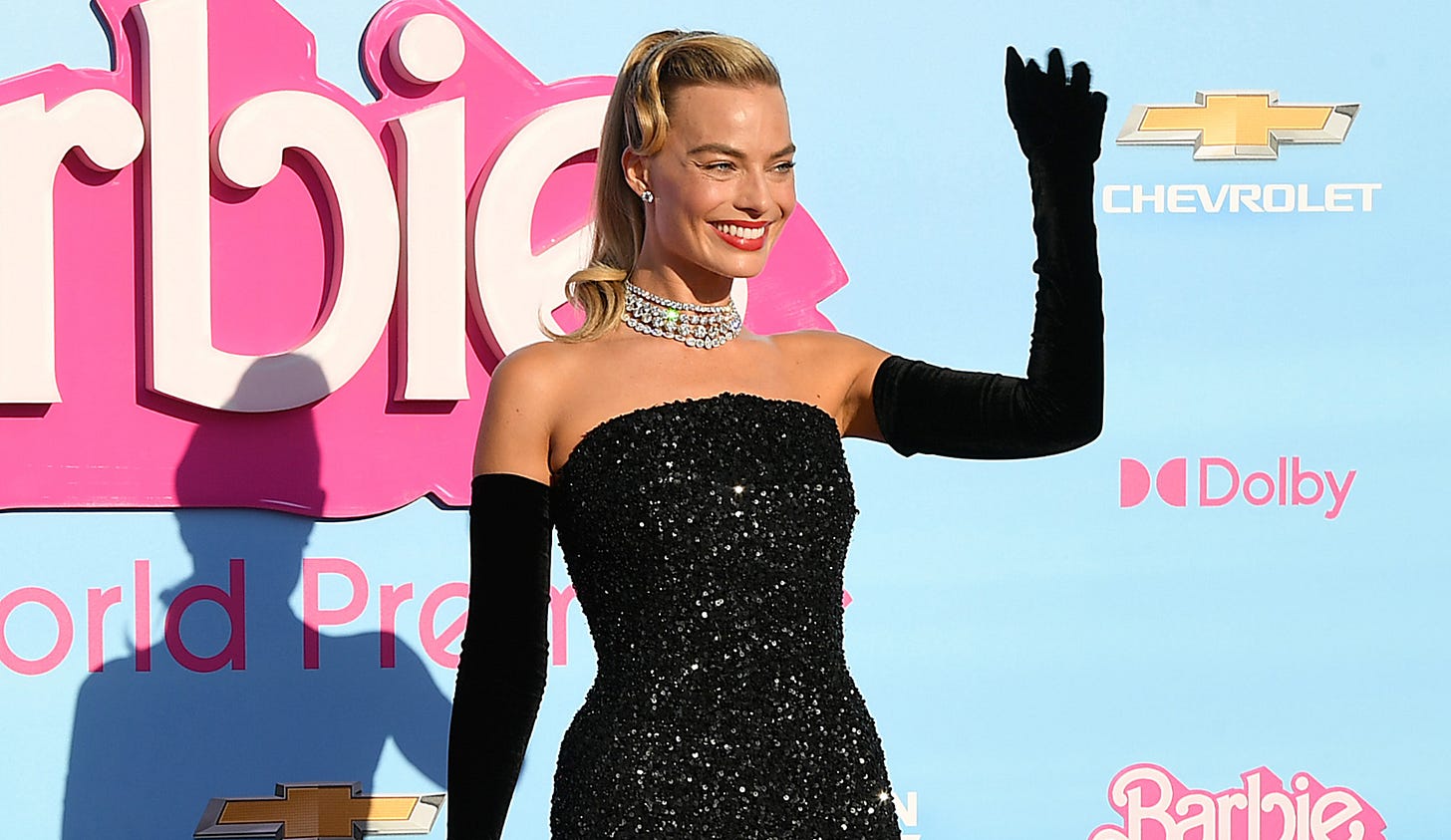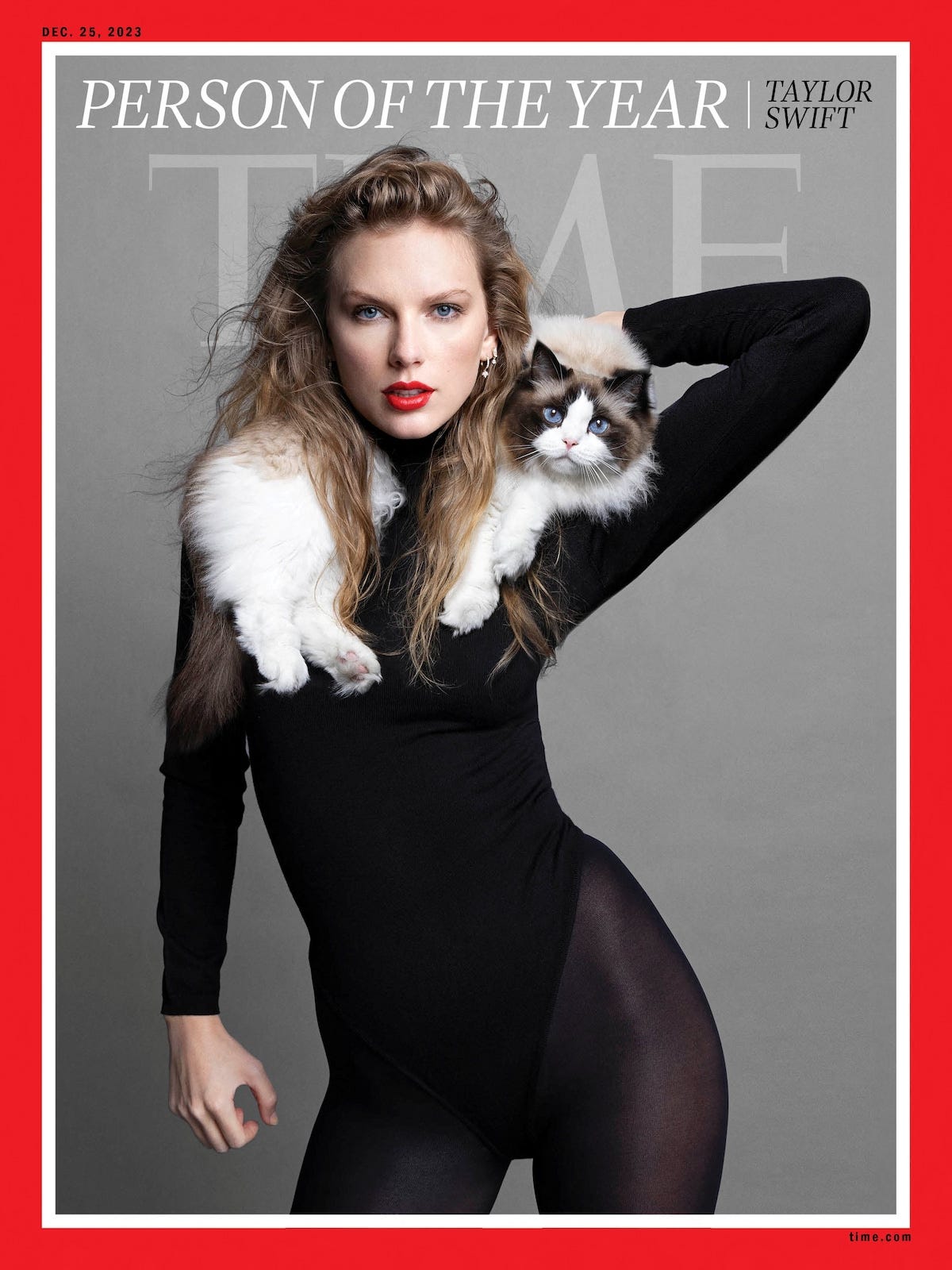Taylor Swift and the Tall Poppy Syndrome
The higher the woman's success, the more we love to cut her down. Taylor knows this better than anyone.
Actress Margo Robbie is on her longest break from acting since she was a child. The Barbie movie finished production almost four years ago. She hasn’t taken on any other roles since.
Why?
After the massive success of Barbie, Margo said,
“Honestly, if I did another movie too soon, people would say, 'Her again? We just did a whole summer with her. We're over it.'
“Everyone's sick of the sight of me for now. I should probably disappear from screens for a while.”1
Unfortunately Margo’s reasoning here is actually scientifically valid.
Have you ever heard of the Tall Poppy Syndrome?
It refers to our penchant for criticizing, resenting or ostracizing women when they get too successful. When one poppy grows too tall, we collectively cut her down.
In 2023 Dr. Rumeet Billan interviewed women from all over the world to study this phenomenon. Here’s a quote from her findings,
“Of 4,710 women surveyed, nearly 90 per cent reported experiencing TPS [Tall Poppy Syndrome] at some point during their careers. TPS can manifest in different ways. It can look like being ostracized or made to feel ashamed or embarrassed because of your accomplishments. It can look like being bullied, knocked down or criticized for getting ahead. It can also look like others taking credit for work you’ve done or convincing you it’s best not to celebrate your success.”2
90% of women in the work force report experiencing backlash for their success and ambition. That’s… a very high number. Here’s a helpful info graphic put out by Women of Influence to break this phenomenon down:

While the perpetrators of Tall Poppy Syndrome are both men and women, the victims are mostly women. Societally we have a much higher tolerance for the visible success of men than of women.
For example, when author Glennon Doyle released her third book Untamed the New York Times review’s title was “A THIRD Glennon Doyle memoire?” which asked the question, “Do we really need a third memoire from this woman?” Meanwhile that very same week, David Sedaris’s 48th memoire The Best of Me came out. The first line in that book review by the New York Times was “You must read ‘The Best of Me.” It never asked if 48 autobiographical books is too many from David Sedaris.
Hollywood loves growing tall poppies. Then loves to cut them down.
In Hollywood since the successful women are so much more visible to the world than other industries, the Tall Poppy Syndrome is all the more pronounced.
We love to tear down the “it” girl. Our tolerance for women in the limelight has an expiration date. Whenever the “it” girl claims the spotlight, society is tapping their toes in the wings ready to drag her out of it. It’s only a matter of time.
But TPS is only evident in hindsight. Mid-cut, the cutting is never because she is the “it” girl. No. It’s because she is too fake, too much, too untalented, too brash, too undeserving.
2013 should have been a monumental year for actress Anne Hathaway as she had just won “best actress” for her performance in Les Miserables, but instead her Oscar win spurred a viral movement of vitriol against Anne Hathaway known as “Hathahate.”
But it wasn’t because she was successful, no. It was because she was so annoying. The San Fransisco Chronicle crowned her “The Most Annoying Celebrity.” The New Yorker wrote an article exploring “Why Anne Hathaway is so annoying?”
You would think winning an Oscar would make her more appealing to directors, but the opposite happened. Anne later said, “I had directors say to me, 'I think you're great. You're perfect for this role, but I don't know how audiences will accept you because of all this stuff, this baggage,”3
The musical Chicago is spot on in its portrayal of the society’s treatment of “it” girls. Velma Kelly is the hottest thing in this town! We love her! No wait, Velma who? Forget her! Roxie Hart is adorable! We love her! Never mind. We’re tired of Roxie. Next!
You do not have to look long or hard to find a trail of real life Roxie Harts4.
Judy Garland, Marilyn Monroe, Britney Spears, Mariah Carey- each starlet rose to dazzling fame. Each later spent time in psychiatric wards after the public tired of them.
Taylor Swift: The tippy tallest of all the tall poppies
Enter Taylor Swift.
Smack in the middle of what was already the highest grossing tour of all time, fresh off winning her fourth grammy for best album (becoming the only artist in history to do so), currently riding the media frenzy of the most covered relationship in the world, four months out from being the first musician to ever be awarded person of the year by Time Magazine, she dropped not just a brand new album, but a double album.
Interesting timing, no?
Taylor Swift’s poppy had never been higher. Honestly, has any pop star’s poppy ever been this high?
It’s debatable.
Begging the question, regardless of what she put out, was it destined to be heavily critiqued?
And The Tortured Poets Department was heavily critiqued.
The New York Times said it was “unrestrained, imprecise, unnecessarily verbose” and in serious need of an editor. British music site NME called the album “flat and cringeworthy.” And The Atlantic said, “Much of the album is a dreary muddle.”
Whether you personally love it or hate it, is there a world where this album wouldn’t be raked through the mud?
It’s hard to imagine given her current level of exposure.
If she had taken a page from Margo Robbie or Adele and gone quiet for two years before releasing something new, would this album have been praised more?
We’ll never know, but the timing of the release was particularly curious because this isn’t Taylor’s first poppy-cutting rodeo. In 2016, just after the then peak of her career with her smash album 1989, the #taylorswiftisoverparty reached such a fever pitch that Taylor curled up and retreated from the public eye for an entire year.
Taylor Swift more than anyone, is acutely tuned into society’s limited tolerance of successful women.
In her song “Nothing New” she says,
“Criticize the way you fly
When you're soaring through the sky
Shoot you down and then they sigh
And say, "She looks like she's been through it"Lord, what will become of me
Once I've lost my novelty?”
In 2019, she told The Rolling Stone, “when you realize the rules of the game you’re playing and how it will affect you, you got to look at the board and make your strategy.”
No one knows the rules of this poppy-cutting game more than Taylor Swift, so why would she drop her new double album at the very peak of her unprecedented fame and success? Why not wait?
Is the Tortured Poets Department a purposely framed portrait of the shears cutting a tall poppy?
Was this on purpose?
Is The Tortured Poets Department Taylor’s version of Chicago the Musical? Jazz-handing its way through the dark underbelly of society’s cruel habit of cutting down successful female artists?
We know she’s a mastermind, is this album a pre-pointed finger, poised and ready to point out our poppy-cutting ways? Is it an invitation?

The first line of “Who’s Afraid of Little Old Me?” reads, “The who's who of ‘Who's that?’ is poised for the attack.”
“I Can Do It With a Broken Heart” says,
"Lights, camera, bitch smile even when you wanna die. Breaking down I hit the floor all the pieces of me shattered as the crowd was chanting 'More!"
The last line is “Ah come for my job.” Like an invitation. A challenge.
(I mean. Has anyone else noticed? TP= Tallest Poppy. TP= Tortured Poets.……..)
But nothing shows she is giving the Tall Poppy Syndrome a nod and a wink (and the middle finger) than the closing song of the album “Clara Bow.”
Who was Clara Bow?
The original “it” girl. Literally. She was in a movie called “It” and everyone called her the It girl.
At her peak in the 20s, she was Hollywood’s crowned jewel. Silent movie star. She was raking in over 45,000 fan letters a week.
But after a few years in the spotlight, an article came out accusing her of all manner of loose behavior including beastiality and threesomes with married men. Everything in the article was later proved false, but the damage was done. Her movie contracts were canceled.
Clara spent the majority of the rest of her life in an asylum and died destitute.
In the song Clara Bow, Taylor says, “Beauty is a beast that roars. Down on all fours. Demanding ‘more.’ Only when your girlish glow flickers just so do they let you know it's hell on earth to be heavenly.”
It’s as if with this album, Taylor’s poppy is pulling herself to her tallest height, looking society’s shears dead in the eye, flipping them the bird and saying, “Go on then. Come at me. I’ll be the tortured artist you love to cut so much.”5
Do you enjoy thinking about and discussing all things patriarchy and feminism?? Cool me too. Come discuss with me and the Matriarchal Blessing community by becoming a paying subscriber. Our next gathering will be in July and we will be discussing Ruth Whippman’s book BoyMom.
Alternatively, you could also just pay me for my work just cause, that is also very cool and very appreciated! Thank you!
*This article was originally published on April 28, 2024.
I mean, minus the murder.
She’s gonna be fine guys. She’s a billionaire. :)











I’m a guy, and I’ve noticed this. Women in politics are scrutinized and held accountable for relatively minor peccadillos the Boy’s Club could just laugh off. Same in business. If one of you gets leadership responsibilities, you’re watched far more closely, held to much stricter standards, and cut far less slack. Cultural misogyny is real.
America has never had a female president. Some countries have had a female president. Some have had more than one. Some have had female leaders elected twice.
America, not once.
Is it because of a lack of quality, competent female leadership?
We've had Trump twice now. Are we to believe that he is truly the better choice? He just added a Trillion dollars to the US debt. Not a peep.
I refuse to believe that the best we can do is predominantly straight, white male, married with children.
Certainly a "Syndrome" from where I sit.